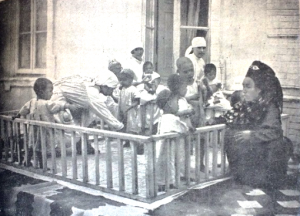
Day nursery in Soviet Turkmenistan
International Working Women’s Day invites us to renew the fight for a communist society. In communism, working together and seeing all workers as part of our own human family, we can establish the conditions for ending racism, sexism, xenophobia and homophobia.
We stand in the tradition of Bolshevik women’s organizations that struggled to transform everyday life.
Before capitalism, families farmed together, producing for the market and for family survival. This work, necessary for reproduction and survival, was shared by all family members, and usually more than two generations. Despite sexist division of labor, the family was an economic unit of production, reproduction and consumption. In many agricultural communities, it still is.
Capitalism separated most working people from their means of production. Some became landless farm laborers. Many moved to cities to sell their labor power. Even now, many small landowners have to work for wages to survive. For most people around the world, the family is no longer the economic unit of production.
In capitalism, however, the family is still a unit of consumption. Families pool their earnings to pay for food, shelter, and other necessities. This is true in socialism as well.
Reproduction also takes place in the capitalist (and socialist) family. This includes raising the next generation of workers. It also includes cooking, laundry, cleaning, everything that makes it possible for the worker to work the next day.
Early capitalism’s sexist division of labor created conditions in which male breadwinners sold their labor power and women did the unpaid labor of maintaining the home. This was the capitalist ideal. In reality, working-class women —particularly Black and immigrant women— have to work for wages while doing all the unpaid labor of keeping the family alive.
We share the vision of the Bolshevik women who understood that communism was not bound by capitalism’s doubly exploitative view of the family as an economic unit. They fought to transform everyday life by socializing the work of consumption and reproduction. They organized collective kitchens, laundries, and childcare. We too see those functions not as individual women’s “domestic” labor but as collective work.
We fight for a communist society where the work of raising children, providing food, clean clothes and comfortable living spaces will be shared by all. Regardless of gender, and including all ages as appropriate.
That means more collective living and eating arrangements. That means seeing our homes not as little private spheres, but as a larger sphere of our human family.
Preparing and sharing food collectively will create a material basis to see each other this way. When the preparation of food is the work of the collective, in the same way as the growing of food, it will be respected. We will end the gendered view of “women’s work” which is somehow less worthy of respect than “men’s work.”
And nobody will be stuck doing any one kind of work their whole life.
Meeting the needs of the collective family
We envision a society where each receives according to need. Sometimes we fall back into old arguments in trying to explain that we’re not fighting for “equal pay for equal work.” Comrades sometimes say, for example, “If I have four kids, I need more food than someone with only two kids.” This helps us to explain how society can function without money. However, it maintains the capitalist/socialist view of the family as an economic unit.
For tens of thousands of years, in pre-class communism, people commonly lived in groups of about 25. Maybe 20 groups linked together to form a tribe. They were not necessarily related. (We know this from burial sites and from present-day foraging societies.) People who live that way describe their relationships as being emotionally bound together in a way that most people in capitalist societies can’t really imagine.
We are building a communist future, not trying to replicate the past. The words we have are inadequate to fully describe it. The “village” in the expression “it takes a village to raise a child” approximates what we mean—discarding oppressive patriarchal village traditions.
We mean relatively small cooperative groups, where everyone knows each other, bound together by the party into a global communist society. The more we can live in collective settings, the more our relationships will be based on bonds of affection, cooperation and solidarity, rather than economic necessity.
This will provide a material basis for the fight against sexist and patriarchal abuse of women and children in the family unit. Unfortunately, we all know women who stay with abusive husbands because the husband is the breadwinner. In larger collectives, women will be free to leave abusers, knowing that they and their children will not suffer economically.
Men who have been taught that it is okay to abuse women and children will either change or be very lonely. Lonely, but not cold or hungry. They, too, will be part of the society which makes sure that everyone’s needs are met. And they will be part of a society that struggles with them to see women and children as comrades rather than possessions.
The same is true of teenagers, especially LGBTQ+ teenagers who often end up on the street because of parental rejection and abuse. We will fight to take care of everyone together.
What this means today is to do our best, within the limits of capitalism, to fight for a communist world. It means that we begin now to develop communist social relations. We strengthen the bonds of collectives which support each other emotionally as well as politically, understanding that the personal is political.
It means a principled fight against sexism. It means encouraging and facilitating the leadership of women workers and youth.
As the Bolshevik women knew a century ago, it means fighting for communism and the transformation of everyday life.

